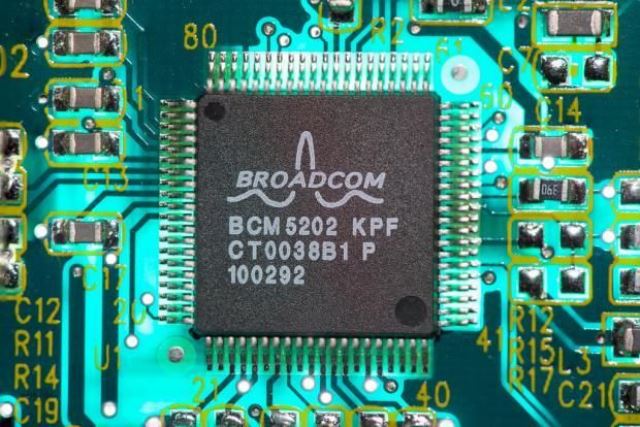Broadcom has posted a 5.6 percent rise in third-quarter revenue to $5.82 billion thanks to acquisitions of software major CA and Symantec. Net income fell to $614 million from $715 million.
 Broadcom’s Semiconductor solutions revenue fell 4 percent to $4.2 billion. Infrastructure software revenue of Broadcom increased 41 percent to $1.6 billion due to the contribution from the acquisition of Symantec in 2020.
Broadcom’s Semiconductor solutions revenue fell 4 percent to $4.2 billion. Infrastructure software revenue of Broadcom increased 41 percent to $1.6 billion due to the contribution from the acquisition of Symantec in 2020.
The pandemic-led shift to work-from-home has fired up demand for infrastructure such as data centers at a time when the semi-conductor industry is gearing up for the launch of 5G phones that use higher priced chips, Reuters reported.
Semiconductor solutions
Networking revenue of Broadcom rose 9 percent sequentially due to demand from cloud customers as it began to ramp for next generation Tomahawk 3 and Trident 3 switch products. Routing demand also remained strong as telcos launch Jericho 2 in the edge and core networks.
Broadband revenue rose 7 percent sequentially in Q3 due to demand for the next generation cable modems — cable DOCSIS 3.1, which was partially offset by a decline in the satellite set-top boxes.
Wireless revenue fell 4 percent sequentially in Q3 due to the expected typical brand being pushed out this year.
In server storage connectivity, where the majority of the revenue is tied to enterprise, Q3 was up 10 percent sequentially. However, expected softness in enterprise demand will likely result in server storage revenue declining in high single digits quarter-over-quarter in Q4.
Software
CA revenue rose 6 percent year-on-year, flat sequentially. Symantec revenue was flat sequentially and contributed over $400 million in the quarter. Similar to CA, bookings in our Symantec core accounts are growing, offsetting the transition out of the smaller commercial accounts as we continue to rationalize the business.
Brocade revenue rose 3 percent year-over-year, and was down significantly, sequentially.
Broadcom forecast current fourth-quarter revenue of $6.4 billion, plus or minus $150 million, encouraged by the upcoming 5G phone launches and strong demand for its data-center chips from the growing remote work market.
Hock Tan, president and CEO of Broadcom, said: “Our outlook for the fourth quarter reflects a strong anticipated ramp in wireless, as well as the surge in demand for networking from cloud and telecom customers, more than offsetting expected softness in enterprise.”
Apple supplier Broadcom said on Thursday that a ramp-up of annual chip shipments would be later this year than most, likely signaling that the next iPhone will arrive after the usual late September launch date.
Broadcom, which earned about a fifth of its revenue from Apple in 2019, said a ramp-up of chip shipments for what analysts believe is the next iPhone will run into the final quarter of the calendar year, a quarter later than most years.
Broadcom in June warned that revenues for its quarter would be below expectations because of a delayed phone launch from its North American mobile phone customer.
Analysts have pushed out their expected launch date of Apple’s 5G iPhone to October after travel restrictions imposed by the coronavirus pandemic disrupted work on the devices.
